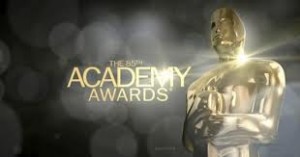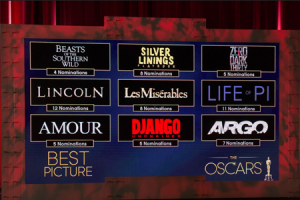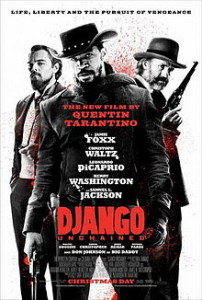I’m on record stating rather emphatically how much I detest the Annual Academy Awards telecast. Because I have little regard for preening, pampered poseurs showing off their borrowed frocks and bling-bling as a prelude to a three-hour show – only six minutes of which anyone really cares about (i.e., the time it takes to present Oscars for best supporting actor and actress, best actor and actress, best director, and best picture)…
And, remarkably enough, the host comedians do little to relieve the boredom of the interludes between these carefully spread-out moments.
(“My Review of the 2008 Oscars,” The iPINIONS Journal, February 25, 2008)
 That said, here are my six picks, plus a bonus for best original song – because my pick in this category is a consummation so devoutly to wished:
That said, here are my six picks, plus a bonus for best original song – because my pick in this category is a consummation so devoutly to wished:
Best Actor – in Leading Role
Daniel Day-Lewis in Lincoln because not since Michael Jordan played in his prime has any individual displayed such unparalleled talent in any field of endeavor as Day-Lewis has in acting. This will make him the first actor in history to win three Oscars in this category. For a little perspective, though, it might be helpful to know that Meryl Streep won her third last year for Best Actress, and that Katherine Hepburn won four.
But Day-Lewis is so good that he could end up winning an Oscar for playing a role he initially turned down because he did not think he could do the character justice. Perhaps because he’s not American; notwithstanding that this has proved no stumbling block for a surprising number of foreign actors who have played American characters quite convincingly.
Still, Hugh Jackman in Les Misérables deserves honorable mention for pulling off the improbable feat of both acting and singing like a first-rate performer, which is much more than I can say for his main co-star Russell Crowe – whose acting was an ode, but who sang like a toad.
Best Actor – in Supporting Role
Tommy Lee Jones in Lincoln because, well, acting with Day-Lewis brings out the best performance in any supporting actor. To be fair, Jones is one of those character actors who – from his breakout performance in The Executioner’s Song (1982) – seemed destined to be hailed as an Academy Award-winning actor. As with Christopher Plummer last year, though, I never thought it would take so many years for him to fulfill this destiny. Jones finally won this same category in 1994 for The Fugitive. Lincoln should make him a two-time Academy Award-winning actor.
Best Actress – in Leading Role
Jennifer Lawrence in Silver Linings Playbook because, with all due respect to Lawrence, this is the only way members of the Academy will be able to recognize the truly Oscar-worthy performances of her co-stars Bradley Cooper and Robert De Niro.
Best Actress – in Supporting Role
Ann Hathaway in Les Misérables for the same reason Jennifer Lawrence will win for her leading role. In this case, the indirect nods are to her co-star Hugh Jackman and director Tom Hooper – who, quite shockingly, was not even nominated for Best Director.
Best Director
Steven Spielberg for Lincoln only because, quite stupidly, the Academy failed to nominate Ben Affleck, the director of the sure winner for Best Picture, Argo. Mind you, this is not to suggest that Spielberg is not worthy; after all, he is almost to directing what Day-Lewis is to acting. (If there were an Oscar for the biggest snub, Affleck would win hands down.)
Best Picture
 Argo because it soared both cinematically and emotionally. Not to mention its not so subtle message to Iran that America is bound to win their game of Chicken over its nuclear program because America has the political intelligence to match its military might.
Argo because it soared both cinematically and emotionally. Not to mention its not so subtle message to Iran that America is bound to win their game of Chicken over its nuclear program because America has the political intelligence to match its military might.
Some critics are slamming Affleck for the artistic license he took in depicting parts of this thriller about the real-life CIA rescue of six American diplomats from Iran during the 1979 hostage crisis. They note, for example, that Iranian security forces did not uncover the caper at the very last minute and began firing at the getaway plane as it was taking off.
Except that their criticisms are plainly misguided; not least because this is a movie based on real events, not a documentary film. In fact, Oscars are awarded for Best Documentary Feature precisely for this reason.
What’s more, I wonder if these critics think The King’s Speech won Best Picture two years ago because everything depicted on screen was precisely as it happened in real life…? Not to mention that Spielberg took such artistic license in Lincoln, the only picture that stands any chance of upsetting Argo, that his factual errors make those Affleck committed seem as inconsequential as merely failing to dot an ‘i’. (For example, the two representatives from Connecticut did not vote against the Thirteenth Amendment abolishing slavery as Spielberg depicts.)
 Meanwhile, given its compelling subject matter, Django Unchained deserves honorable mention. Because, like Argo, it soared emotionally but was so riveting cinematically that it was nominated for Best Cinematography as well; whereas Argo was not.
Meanwhile, given its compelling subject matter, Django Unchained deserves honorable mention. Because, like Argo, it soared emotionally but was so riveting cinematically that it was nominated for Best Cinematography as well; whereas Argo was not.
I am all too mindful, however, that the main plot of this movie involves a Black cowboy outwitting and killing a bunch of White folks. Granted the Whites in this case are inhumane, slave-holding SOBs. Yet celebrating it in this context seems a bridge too far for the voting members of the Academy – who, according to the February 19, 2012 edition of the Los Angeles Times, are 94 percent White and 77 percent male.
Apropos of critics, you’ve probably heard Spike Lee, the director of such “racially affirming” films as She’s Gotta Have It and Jungle Fever, spewing indignation about Django Unchained being “disrespectful to my ancestors” – as he is quoted saying in the December 21, 2012, edition of Vibe magazine. It speaks volumes about his professional integrity and intellectual curiosity, however, that he boasted about having no intent to ever see this film by (White) director Quentin Tarantino.
But all you need to know is that Lee spewed equally vacuous criticism about the Academy Award-winning film The Color Purple by (White) director Steven Spielberg. Not to mention his demonstrably uninformed fulmination about Academy Award-winning director Clint Eastwood not including one Black soldier in his two films about Iwo Jima, namely Letters From Iwo Jima and Flags of Our Fathers. The only plausible explanation for his criticism in each case is race-based envy and resentment. (I addressed Lee’s race-baiting ignorance in this latter respect more fully in “Spike Lee vs. Clint Eastwood Over No Blacks in War Movies,” June 10, 2008)
All the same, for the record, please beware that criticizing Tarantino for having his White characters use the word “Nigger” too many times in Django Unchained is rather like criticizing Spielberg for having his German characters use the word “Vermin” too many times in Schindler’s List. The criticism in both cases reflects an insidious strain of political correctness that presumes even to rewrite history.
Best Original Song
“Skyfall” by Adele for Skyfall because, in this age, when style too often triumphs over substance (e.g., think how indispensable style is to the performances of singers like Lady Gaga and Nickki Minaj), she personifies the saving grace of pure, unadulterated talent. And she’s beautiful to boot.
What’s more, I suspect her song had even more to do with making this Bond film the billion-dollar blockbuster it has become than Paul McCartney’s “Live and Let Die” had to with making that eponymous Bond film the success it was.
And the Oscar goes to…
Related commentaries:
2008 Oscars…
2012 Oscars…
Lee vs. Eastwood over Blacks in movies…
* This commentary was originally published yesterday, Saturday, at 7:44 am